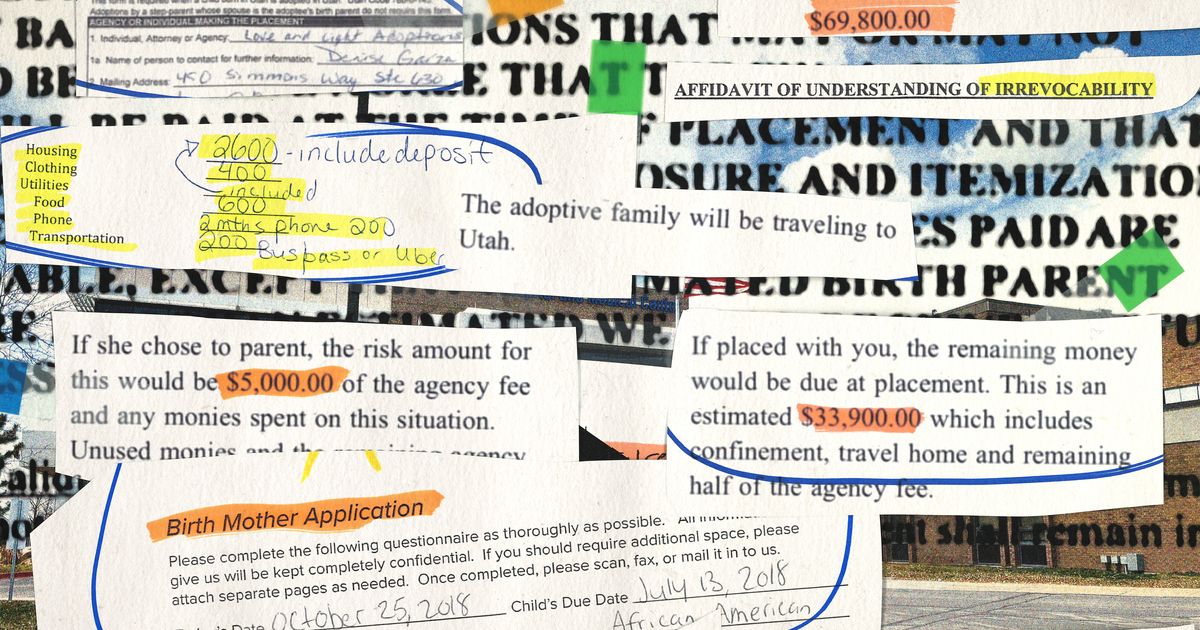‘People Say, You Sold Your Baby’

🌈 Abstract
The article discusses the exploitative nature of the private adoption system in Utah, which has become a hub for fast-track, high-dollar adoptions with minimal oversight. It explores the experiences of birth mothers like Tia Goins and Ashley Mitchell, who felt pressured to give up their children, as well as the perspectives of adoptive parents who grapple with the complexities of the adoption process in Utah.
🙋 Q&A
[01] "People Say, You Sold Your Baby"
1. What led Tia Goins to consider giving up her daughter Tiona for adoption?
- Tia Goins had been abandoned at birth by a mother with substance-use disorder and entered the foster care system, eventually having her own daughter Tiona at age 20.
- With no stable living situation and winter approaching, Goins resolved to give up the baby and searched online for "free adoption help".
- She was then connected with Flossie Green, an adoption facilitator who told her that if she signed adoption papers at an agency in Utah, she would receive $1,000 to get on her feet.
2. What makes Utah's adoption system particularly exploitative?
- Utah's adoption system is considered the most exploitative in the nation, serving as a "clearinghouse for fast-track, high-dollar placements" with minimal oversight.
- The state legislature has made it a hub for this type of adoption activity, allowing private agencies to offer pregnant women in crisis situations financial incentives to give up their children.
- These desperate situations make it difficult for birth mothers to withdraw from the adoption process even if they change their minds.
3. What were some of the problems faced by Garza, the founder of an adoption agency in Utah?
- In 2008, one of the adoptions handled by Garza's agency, Heart and Soul, was overturned because the agency had not followed the federal Indian Child Welfare Act, which gives preference to tribal members when one of their children is put up for adoption.
[02] Adoptive Parents' Perspectives
1. How do some adoptive parents feel about the adoption process in Utah?
- Adoptive parents who go to Utah to adopt a baby sometimes do so without fully understanding the exploitative nature of the market they are a part of.
- They are often financially and emotionally depleted from years of infertility treatments and can be overwhelmed by the complexity of the American adoption system.
- Some adoptive parents interviewed have mixed feelings about their adoption experience, loving their children but feeling lingering unease about how they came to join their family.
2. What was Ashley Mitchell's experience with giving up her first child for adoption?
- Ashley Mitchell, a fifth-generation Utahan, felt conflicted over her decision to give up her first child for adoption at age 26, on the advice of her family and social workers from the Church of Jesus Christ of Latter-day Saints.
- She believed the "lie the industry tells birth mothers" that giving up her baby was her "only redemption" and the only way to find "grace" according to the church.
[03] Aftermath for Birth Mothers
1. What challenges did Jasmine face after returning home from Utah?
- When Jasmine returned to her home state after giving up her child for adoption in Utah, she not only faced the same unresolvable problems that had led her to adoption in the first place, but she also worried that the adoption agency would pursue her for the thousands of dollars in expenses they had incurred.
- Jasmine had no income or childcare, and the situation left her in a state of panic, causing her to lose a significant amount of weight.
</output_format>